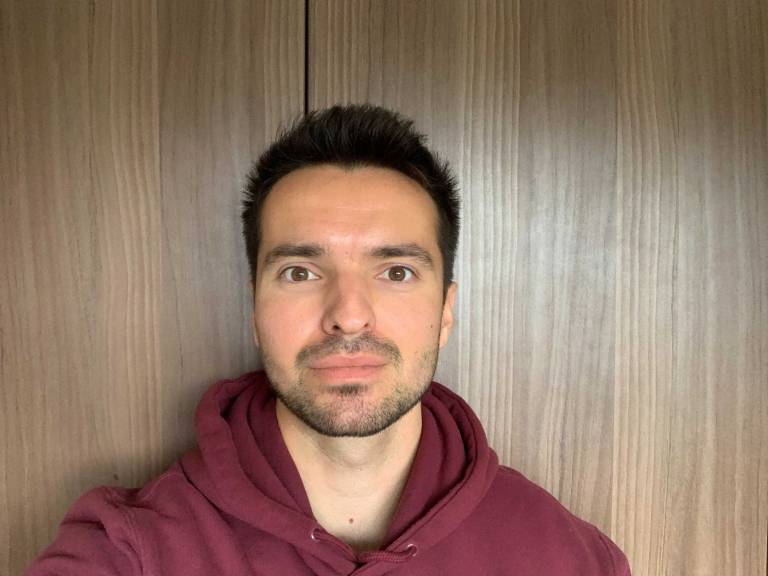The learning process doesn’t stop after university
Interview with UCL Alum, Richard Glass, Civil Engineering and a Masters in Computer Science, shares his career journey and encourages you to spend more time working on your CV.

8 December 2021
Degree programme: MSc in Computer Science
Graduation year: 2020
Current job role: Solutions Developer, IQVIA
What did you study at UCL?
I studied MSc in Computer Science at UCL, and in addition, I took on some side projects which greatly helped me to learn more about the software field and prepare me for my job search. Alongside setting up a new start-up with one of my coursemates, I continued to develop an app I had initially created as part of my thesis from my Undergraduate Civil Engineering course.
Both of these enabled me to form a deeper understanding of software engineering, as I needed to adopt a proactive role in the development of these projects.
What motivated you to pursue this line of work?
Ever since my first exposure to coding during my undergraduate studies, I have loved writing code. Alongside sharpening my coding skills at UCL, the Design and Software Engineering modules in my Master's course was incredibly useful for not only teaching the importance of Agile methodologies in the Software Development space but also giving me and my peers the opportunity to apply the theoretical knowledge through developing an app for the NHS!
These experiences taught me how software is developed – including best practises for building projects and how the software development lifecycle exists. In addition, I gained valuable skills in being able to communicate with a client who wasn’t necessarily technical in order to arrive at a solution that worked for them.
How did you get from UCL to where you are today?
After graduating from UCL, I continued to develop some side projects to refine my skills and then began my application process in January of the following year. I found LinkedIn very helpful at this stage, and shortly after starting actively looking for jobs, I was contacted by a recruiter at my current company who helped me to land my current role at IQVIA.
What is the biggest lesson you have learned from your career so far?
I’d say the biggest lesson I’ve learned from my career so far is that the learning process doesn’t stop after university – the field evolves so rapidly, meaning you need to keep up with that. What may be new and cutting edge now may be deprecated in just a few years.
I personally love this learning process, and I find it’s much easier to keep up with developments in the field now I’m working alongside others who share my passion for what we do.
What does a normal working day look like for you?
On a standard day, I’ll log on at 9 am and handle any admin and prep for the day ahead. My first meeting is a daily stand-up at 10 am where the Developer team will give updates on their progress and sync up with each other.
I’ll then have various other meetings depending on where we are in our Sprint, which may be limited to just the Developers or also include some stakeholders.
Outside of meetings the majority of my time is spent either writing code or reading documentation, which is my favourite part. If there’s a particularly complex problem then I may hop on a call with another colleague, so we can put our heads together to tackle the problem.
What is the most rewarding part of your work?
The most rewarding aspect for me is the process of taking ownership of implementing a new feature, bringing that from the initial research phase through to its final delivery.
What is the most challenging part of your work?
On the flip side, this would also be the most challenging. However, there’s no better feeling when you’ve got your hands on a finished product!
What are currently the most topical issues of your industry? How do you see this growing in the future?
Given the continually evolving nature of the field, I think it’s likely that in future a Software Developer will write less code as we continue to develop more advanced frameworks and languages that abstract away much of the underlying complexity.
As a result, the responsibilities of a developer will increase in scope. It’s not enough in the current landscape just to be able to write good code – there’s undoubtedly growing importance placed on developing your soft skills so that you can effectively communicate with stakeholders.
Solutions Development is as much thinking about what to build as it is how to build it, and I think as that “how” gets easier, our responsibilities will shift even more so towards the former.
GitHub Co-pilot is a good example of this. Who knows how revolutionary that technology may be to the field in the future?
What advice would you give to anyone looking to move into your area of work?
“Spend some time working on your CV to ensure you are properly representing yourself. Build some side projects – I think this is the most effective way to learn and at the end it means you have something to show potential employers. Making a personal website is always a good idea, it can help to separate yourself from other people in the space and it can serve as an extension of your CV.
Current students get free access to VMock - an online tool that can provide immediate tips and advice on how to improve your CV. Find out more.
 Close
Close

